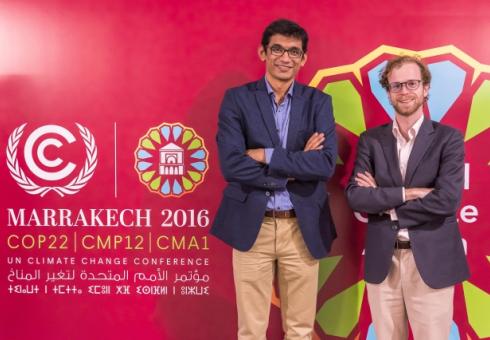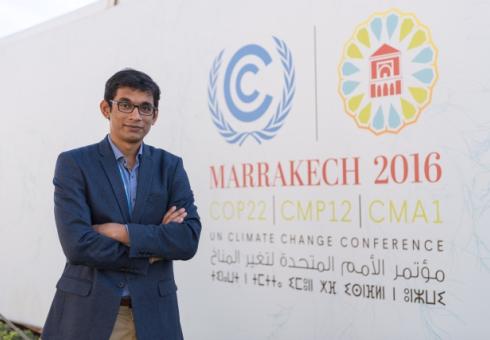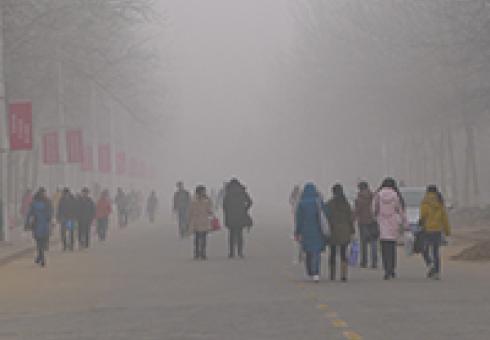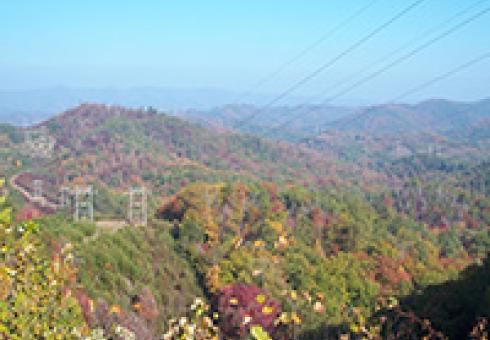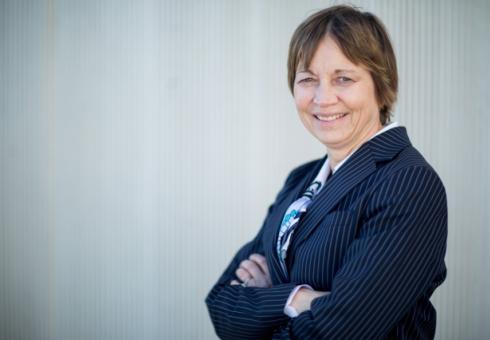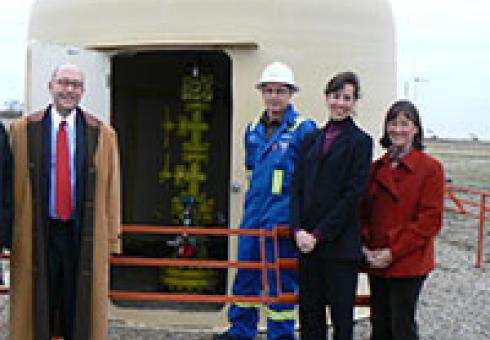News + Media
At UN Climate Change Conference, MIT researchers share insights on implementing climate commitments
MIT: Emissions Trading for Transport = EU’s Cheapest Means of Reducing Transport Emissions; EU officials reportedly receptive to Joint Program study’s findings
“Rather than adopting an approach similar to the corporate average fuel economy (CAFE) standard in the United States, the European Union could achieve similar carbon dioxide emissions reductions simply by extending the existing emissions trading system to encompass transportation (in addition to the electricity generation and energy-intensive industries it currently covers), according to a new study from MIT and its research partners. Using such an approach would be far cheaper (as far as costs to the economy) than utilizing something similar to the CAFE standard, the researchers involved argue.”
Tata Center graduate fellow Arun Singh shares energy-economic modeling research at UN Climate Change Conference
Richard Alley delivers 2016 Carlson Lecture on the physics of glaciers and how ice sheets capture a history of the world’s climate
Two miles thick and a continent wide, piles of snow have been accumulating across the world’s polar regions over millennia. After cycles of melting and freezing, compressing and spreading under their own weight, packed snow formed magnificent glaciers. These majestic, yet powerful, bodies of ice sculpt the land beneath them as they move, responding to the Earth’s climatic changes. As they do so, a new ice sheet layer freezes on top, capturing a snapshot of the current climate and building on the ice record below.
For many, this is enough to inspire awe, but for glaciologists, much more lies beneath the surface.
“I can tell you, I’ve spent a lot of time looking at ice, and I don’t regret it. It is a fascinating undertaking,” said Richard Alley, the Evan Pugh University Professor of Geosciences in Pennsylvania State University’s College of Earth and Mineral Sciences, and this year’s John Carlson lecturer.
“Richard is the world’s foremost expert on the relationship between ice and climate — what ice has to tell us about past climates, the role that ice has played in climate change, and the relationship between continental ice and sea level,” said Kerry Emanuel — the Cecil and Ida Green Professor of Atmospheric Science and co-founder of MIT’s Lorenz Center — as he introduced Alley. The John Carlson Lecture, presented by the Lorenz Center, communicates exciting climate science to a broad audience. Alley’s exemplary efforts in this endeavor and his long list of accolades were some of the reasons he was invited to speak at the 6th annual Carlson lecture. Kerry continued, “[Alley] is also the most energetic and entertaining public lecturer I personally know — living proof that fire and ice somehow go together.” And for attendees of the lecture, Alley’s dynamic nature certainly brought the cryosphere to life.
About 24,000 years ago during the last glacial maximum, ice sheets reached their greatest extent. Stretching down from Canada, glaciers brought soils to Lake Michigan and Erie, and the lobe of Massachusetts’ Cape Cod — a virtual backyard for Boston residents. But around 18,000 years ago, the ice began melting across Europe and North America and receding toward the poles. The climate had changed, Alley explained succinctly, “and you live in the footprint of a great ice sheet and it was a fascinating footprint.”
But it was cause of this climate warming and its physical manifestation on glaciers that piqued Alley’s interest; to learn more, Alley and his fellow scientists drilled down into Greenland’s ancient ice.
Frozen time
Like tree rings, ice cores tell a complicated story of the world’s climate, which Alley has been working to untangle. In the 1990s, extracting a core measuring 2 miles deep into Greenland’s ice sheet allowed Alley’s group to visualize and access a record of the climate there. Alternating layers of thick and thin ice read as winter and summer seasons, respectively, and trapped air bubbles and dust in each layer captured a freeze frame of climatic conditions at that moment in time.
“We can fingerprint the dust,” Alley said, directing the audience’s attention to image of the core and what its contents could reveal about the changing climate. “In that is sea salt, a little bit of pollen, forest fire smoke, micrometeorites falling down from space, odd isotopes that are made by cosmic rays breaking things in the air. Anything that’s blowing through the air falls on the ice sheet.” The team also analyzed chemical signatures from the air bubbles, which shed more light on Greenland’s atmospheric composition throughout its history, and a temperature probe dropped into the middle of the glacier showed that it still had not yet warmed up from the last ice age.
Piecing it together
Using these clues and similar ones from around the world, scientists constructed a record of the world’s temperature that goes back 440,000 years to try to figure out why the climate changed so dramatically. They found that every temperature record on the planet had a similar ice age cycle, moving through periods of warm and cold with shorter episodes running on the back of them. “It doesn’t look like a random generator made it. It looks like a clock made it,” Alley said pointing out the peaks and troughs in the plot. “You could see it going sort of tick, tick, tick, tick.”
The reason for this, Alley continued, can be explained by looking at the ice cores. They showed that while there is some evidence that volcanic eruptions; weather and ocean circulation changes; and natural fluctuations in the Earth’s orbit and sun exposure can affect the climate, the climate largely ignores it. But when ice grows in Canada and the Arctic, the world responds by getting colder, even in places that are receiving more sun, thanks to the Earth’s tilt.
This, Alley emphasized, is a story about CO2 — carbon dioxide. “If you ignore the CO2, no one has ever explained why half of the world ignores its sun and listens to Canada’s ice. If you include the CO2, it all makes sense. Alley and his colleagues discovered that ice growth in Canada causes sea levels to fall 100 meters, and ocean currents, dust and winds to change, which sequesters some of the greenhouse gas into the deep ocean. The reversal of this process moves CO2 out of the ocean and back into the atmosphere, heating up the Earth. Leading Alley to conclude that, “Greenhouse gases really do matter, and we can’t make sense of climate history without them.”
Alley wrapped up the evening’s lecture with an entertaining lesson on the physics of glaciers and a song of caution about the consequences of Antarctic and Greenland ice-sheet melting. Using a pancake and waffle analogy, Alley demonstrated how batter poured on a hot griddle behaves similarly to glaciers, spreading under its own weight. Waffle irons and carefully placed spatulas impeded the batter’s flow, acting as Greenland’s bumpy terrain and flying buttresses that allow the snow and ice to amass. But, as Alley sang in G major, the Earth has been enjoying a relatively temperate climate during the time of humans, but increasing CO2 and melting glaciers could bring that to an end in the foreseeable future.
“In my lifetime we’ve gone from an amazing amount of ignorance to an amazing amount of knowledge. There is an incredible amount to learn,” Alley said, speaking to the scientist in all of us, “so, let’s go find out!”
An EAPS evening
Before the Carlson Lecture began, researchers in MIT's Department of Earth, Atmospheric and Planetary Sciences (EAPS) gathered in the New England Aquarium’s Omni Theater foyer to share their research with the attendees. McGee Lab graduate students Chrstine Chen, Kaylee Brent, and Maya Stokes demonstrated how they reconstruct how precipitation and wind patterns responded to past climate changes as a way to improve our understanding of how rainfall might change in the future. Assisted by microscopes and a sample of Charles River water, Professor Mick Follows, postdoc Jonathan Lauderdale, and researcher David Talmy revealed a complex marine ecosystem — one of the many that they are trying to model with MIT’s Darwin Project. Professor Glenn Flierl and physics graduate student Keaton Burns showed how all the Earth, atmosphere, oceans, and climate components come together using the iGlobe, a real-time depiction of Earth processes.
A private dinner for EAPS donors and friends followed the lecture. During the evening, 2016 EAPS fellows met and thanked their benefactors. Mukund Gupta, a second-year graduate student in the Marshall group, spoke with John Carlson, whose generous gift to the Lorenz Center in EAPS also makes this yearly lecture possible. Likewise, first-year graduate students and this year’s Norman C. Rasmussen Climate Fellows Raphael Rousseau-Rizzi, Ziwei Li, and Tristan Abbott shared their appreciation with their supporter Neil Rasmussen, who is also an MIT Corporation member and EAPS Visiting Committee member. On behalf of the Lorenz Center, Kerry Emanuel and Dan Rothman thanked everyone for attending and for their support, and presented John Carlson with an autographed copy of Richard Alley’s book: “Earth: the Operator’s Manual”.
The John Carlson Lecture communicates exciting new results in climate science to the general public. Free of charge and open to the general public, the lecture is made possible by a generous gift from MIT alumnus John H. Carlson to the Lorenz Center in the MIT Department of Earth, Atmospheric and Planetary Sciences.
Photo: A capacity crowd at the New England Aquarium's Omni Theater enjoyed the 2016 John H. Carlson Lecture, "Big Ice: Antarctica, Greenland, and Boston," presented by Penn State University Professor Richard Alley. (Photo by John Gillooly)
Sea levels are rising, but he’s trying to bring coal back
Trump’s presidency could mean a resurgence of coal, a hollowing out of climate policy, and a shift away from clean energy innovation. MIT Earth and Planetary Sciences Professor Kerry Emanuel warns that the consequences could include major negative health effects; increased food and water shortages, migration pressures and armed conflict; and an America that gets edged out by the rest of the world in a burgeoning clean energy market.
Emissions trading would be more effective than mileage standards, new study shows
As the European Union contemplates new policies aimed at meeting its emissions-reduction commitments under last year’s Paris Agreement on climate change, a new study by researchers at MIT and elsewhere could provide some valuable guidance on the most effective strategy.
How a shift from fossil fuels to low-carbon technologies could alter today’s balance of power
If the Paris Agreement leads to an energy transition from fossil fuels to low-carbon technologies, fossil-fuel-producing nations will likely wield far less geopolitical power than they do now. “Instead of focusing on just two major resources, oil and natural gas, low-carbon energy geopolitics may depend on many additional factors, such as access to technology, power lines, rare earth materials, patents, storage and dispatch, not to mention unpredictable government policies,” writes Sergey Paltsev, a senior research scientist at the MIT Energy Initiative and a deputy director of the MIT Joint Program on the Science and Policy of Global Change. “Despite uncertainty, there is no question that the balance of power in energy geopolitics is shifting from fossil-fuel owners to countries that are developing low-carbon solutions.”
Photo: Hydro-power lines near Fontana Dam, North Carolina (Source: Dana Lane)
MIT’s vice president for research discusses the challenges ahead for MIT and the world
At this time last year, President L. Rafael Reif announced the Institute’s five-year plan for responding to the risks posed by climate change. Maria Zuber, vice president for research and the E.A. Griswold Professor of Geophysics, has been coordinating MIT’s climate action efforts since the plan’s announcement. She recently shared with MIT News highlights from the plan’s first year of implementation — as well as her thoughts on what needs to happen for the world to avoid the worst impacts of climate change.
Q: The Plan for Action on Climate Change includes a number of components focused on the campus, including a goal of reducing campus carbon emissions 32 percent by 2030. What kind of progress has the Institute made on this front?
A: It’s important to underscore that the 32 percent goal is a floor, not a ceiling. Students and faculty have challenged us to become a carbon-neutral campus, and we aspire to do that as soon as we can. We are committed to making investments both on campus and off campus that will lead to a reduction in our overall carbon footprint. Our approach includes a range of strategies, from the expanded use of on-site and off-site renewables, to robust investments in energy efficiency and high-performance building design standards, to efforts to engage our community to reduce consumption.
And we’ve just taken a big step in the right direction with a new agreement to purchase power from a solar farm in North Carolina, in partnership with two other organizations in Greater Boston: Boston Medical Center and Friends of Post Office Square. The Department of Facilities and the Office of Sustainability really led the charge here, and they deserve great credit. This agreement is good news for a lot of different reasons, but let me give you three:
First, this single solar purchase will address approximately 17 percent of MIT’s campus carbon emissions. To give you a sense of the scale you need to achieve this, consider that the new solar development — called Summit Farms — covers 650 acres, while MIT’s campus is just 168 acres. At Summit Farms, 255,000 solar panels will generate 60 megawatts of electricity. MIT has agreed to purchase 44 of those megawatts.
Second, we believe Summit Farms demonstrates to other organizations that there is a collaborative model that works for developing renewable energy projects that otherwise wouldn’t get built. We intend to share our experience on this project far and wide, because we want everyone — would-be power customers, developers, banks, and so on — to know that this makes good sense from both an economic perspective and an environmental perspective.
Finally, on an issue that I spend a lot of time thinking about, Summit Farms will create hundreds of new construction jobs. Many people don’t realize this, but the solar industry now employs more than 209,000 people in the United States — roughly triple the number of jobs in the coal mining industry. If we are going to meet the world’s climate goals, then we have to do a better job of telling the story of the economic opportunities available in the transition to clean energy, and we have to make sure that these opportunities are broadly available in communities around the country.
Q: This year you established a Climate Action Advisory Committee to “consult with and advise” you on the implementation and assessment of the plan. Can you give us an update on the committee’s work?
A: A major focus of the plan was the idea of engagement — that obviously no single institution can solve climate change on its own, so what we need is to engage with industry, government, and civil society to develop the kind of multifaceted solutions that reflect the complexity and urgency of the climate threat. With that in mind, the new committee’s first charge is to help come up with ideas for engagement, along with ideas for assessing whether or not we’re having the kind of impact we want to have.
We had the first committee meeting of the fall semester on Oct. 4, and we began with a conversation about the politics of climate change. Climate change is a technological problem, a business problem, an urban design problem — the list goes on. But ultimately it is a political problem, and we want to do what we can to inform the debate with high-quality research and analysis, grounded in the best science.
I was really impressed with the quality of the discussion we had in the committee. We have students, postdocs, staff, faculty, alumni, and Corporation members all thinking hard about what MIT can do to engage productively with other organizations.
You know, 2014 was the warmest year on record — until 2015 replaced it. And unfortunately, 2016 is set to break the record yet again. Climate change is not just something for future generations to worry about — it’s happening now. And I think the members of the committee share a sense that we all need to roll up our sleeves and help solve this problem.
Q: How would you say that the MIT community has responded to the fact that climate change is now a top priority for the Institute?
A: I always remind people that MIT has been doing excellent work on climate change and related issues for decades. This year, for example, the MIT Joint Program on the Science and Policy of Global Change celebrated its 25th anniversary. I think the Plan for Action on Climate Change has helped to amplify all of this great work, and I think it has inspired more people to join the effort.
We have members of the MIT community coming up with creative ways to extend the plan’s reach. For example, two members of the group MIT Alumni for Climate Action Leadership developed an idea for building an online community of learners and doers, and that idea, in collaboration with the Office of Digital Learning and the Office of Communication, became ClimateX, which is now in a pilot phase.
Let me give you another example: The Environmental Solutions Initiative, along with faculty members who teach the General Institute Requirements, is working to make sustainability-focused content available for embedding into the GIRs. This will ensure that all undergraduates have the opportunity to be exposed to these issues during their time at MIT.
Actions like these, happening all across our community, demonstrate the incredible enthusiasm that members of the MIT community have for doing their part to address climate change.
I also want to make a plug for the forum on climate change ethics that my office is sponsoring on the evening of Nov. 17. The idea for the forum came from Fossil Free MIT, which has done incredible work to organize the event. It will be an important opportunity for our community to discuss the ethical responsibilities facing individuals and institutions in responding to climate change. We’re thrilled that Professor Dale Jamieson from New York University has agreed to keynote the forum. I encourage members of the MIT community to mark their calendars for what I know will be a fascinating conversation.
Overreliance on negative emissions as solution could prevent global climate stabilization

